PRODUCT CODE: MNHO-043


| System | Brand | PICO PC |
| Model | MNHO-043 | |
| Part Number (P/N) | MO43J19ND4L | |
| Processor | CPU | Intel® Celeron® Processor J1900 |
| Processor Base Frequency | 2.0 GHz | |
| Burst Frequency | 2.42 GHz | |
| TDP | 10W | |
| Instruction Set | 64 bit | |
| # of Cores | 4 | |
| # of Threads | 4 | |
| Cache | 2 MB L2 | |
| Memory | Size | Support up to 8GB (optional) |
| Type | SODIMM DDR3L 1.35V Low Voltage (non-ECC) | |
| Slot | 1 | |
| Storage | mSATA | Support mSATA SSD (optional) |
| 2.5" SATA | Support 2.5" SATA SSD/HDD 7mm (optional) | |
| Graphics | Processor Graphics | Intel HD Graphics |
| Graphics Base Frequency | 688 MHz | |
| Graphics Max Dynamic Frequency | 854 MHz | |
| Intel® Quick Sync Video | Yes | |
| Advanced Technologies | Intel® Virtualization Technology (VT-x) | Yes |
| Intel® 64 | Yes | |
| Enhanced Intel SpeedStep® Technology | Yes | |
| I/O Specifications | Display | 1 x HDMI, 1 x VGA |
| USB | 1 x USB 2.0, 1 x USB 3.0 | |
| LAN | 4 x Intel I211-AT Gigabit Ethernet | |
| 802.11 b/g/n WiFi (PCIe Module) | Optional | |
| 3G/4G (PCIe Module) | Optional | |
| Reset Switch | Yes | |
| Expansion Slots | mSATA | Yes (For mSATA SSD) |
| mini PCIe | Yes (For WiFi/WWAN module) | |
| SIM | Yes (6pin SIM Interface) | |
| Power Adapter | Input | AC 100-240V ~ 50-60Hz |
| Output | DC 12V 5A | |
| Safety & EMC | UL, CE, FCC, RoHS | |
| EMC EN55022 CLASS B | ||
| IEC 60950-1 | ||
| Energy saving standards | Energy Star Ver. 2.0 | |
| DOE Level VI | ||
| ErP CoC Version 5 Tier 2 | ||
| OS | Windows | Support Windows 7, 8, 10 & Windows Server (not included) |
| Linux | Support | |
| Firewalls | Support pfSense, Untangle, Debian, Sophos etc. (not included) | |
| Compliance | Approvals | CE, FCC, RoHS |
| Regulatory | EMC Emission EN55022 | |
| Others | System Input | DC 12V |
| Consumption | 10W ~ 15W (approx.) | |
| Cooling | Fanless | |
| Chassis | Brushed Aluminum Alloy (Rugged surface) | |
| Mounting | VESA Mount | |
| Working Temperature | -10°C ~ 50°C | |
| Size | 126 x 134 x 40.6 mm | |
| Package | 1 x Mini PC, 1 x Power Adopter, 1 x Power Cord, 1 x VESA mount |

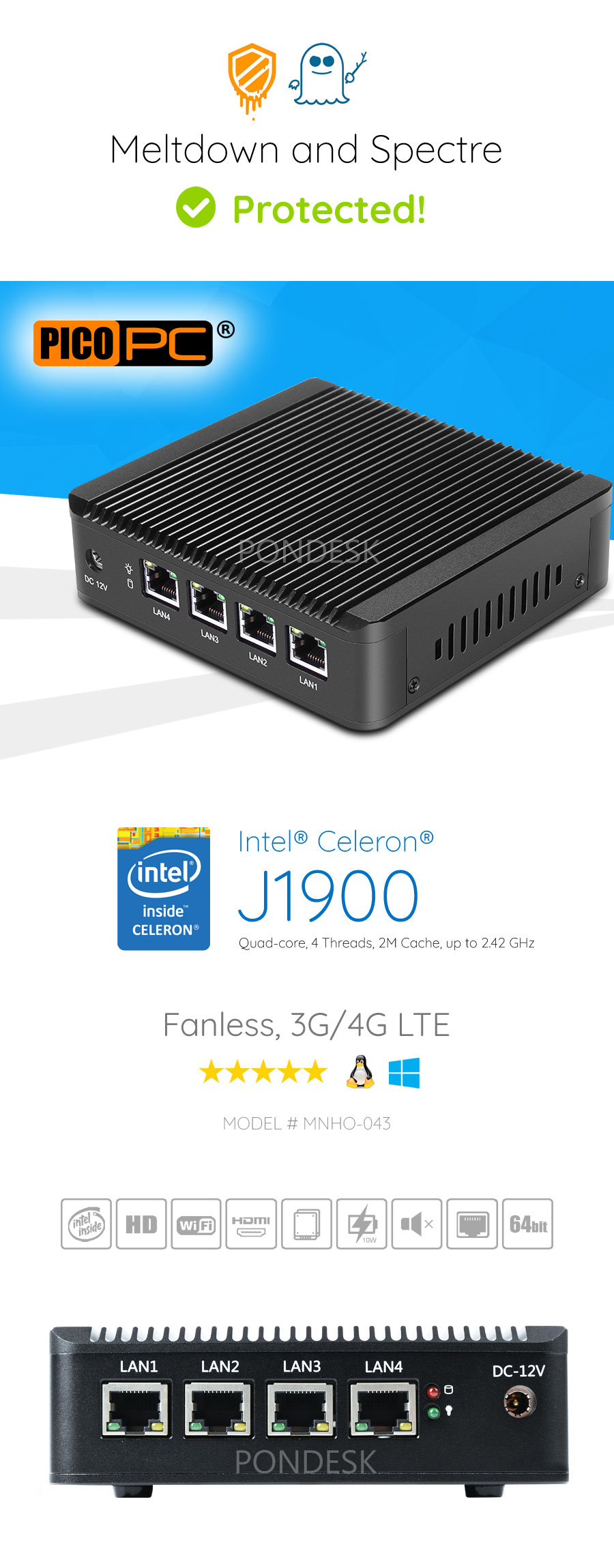
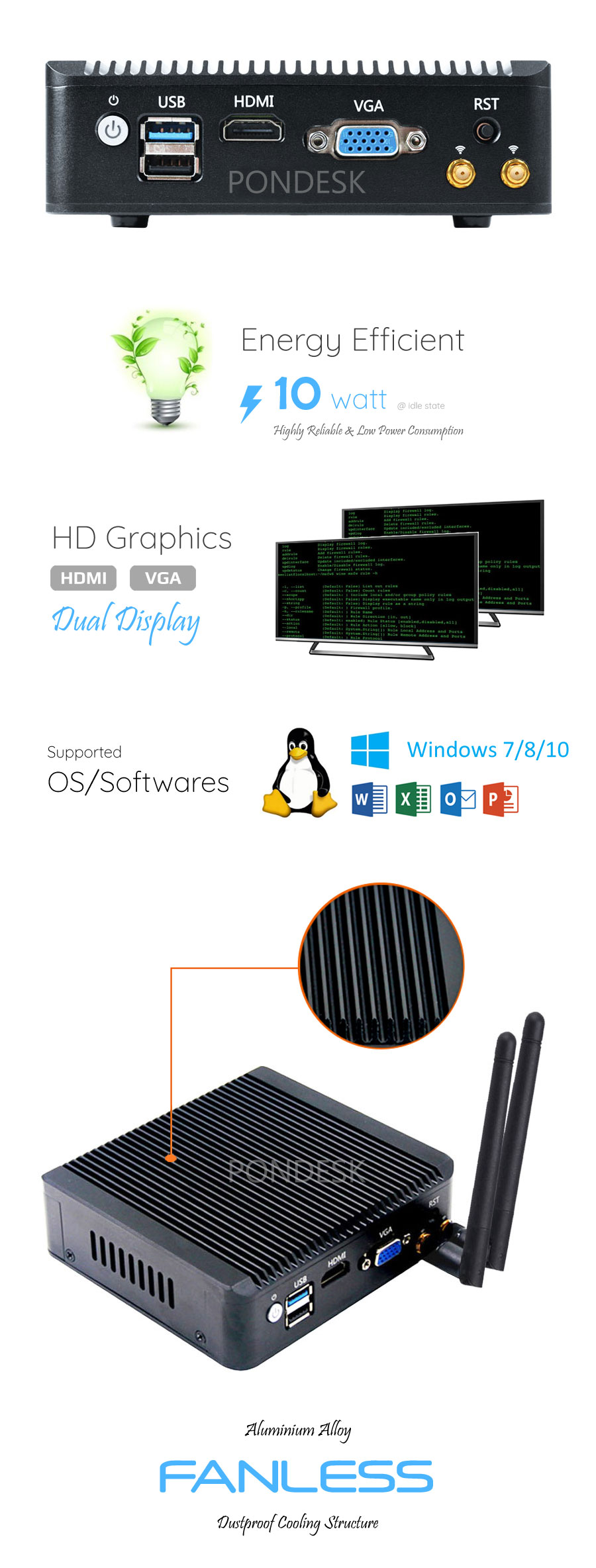
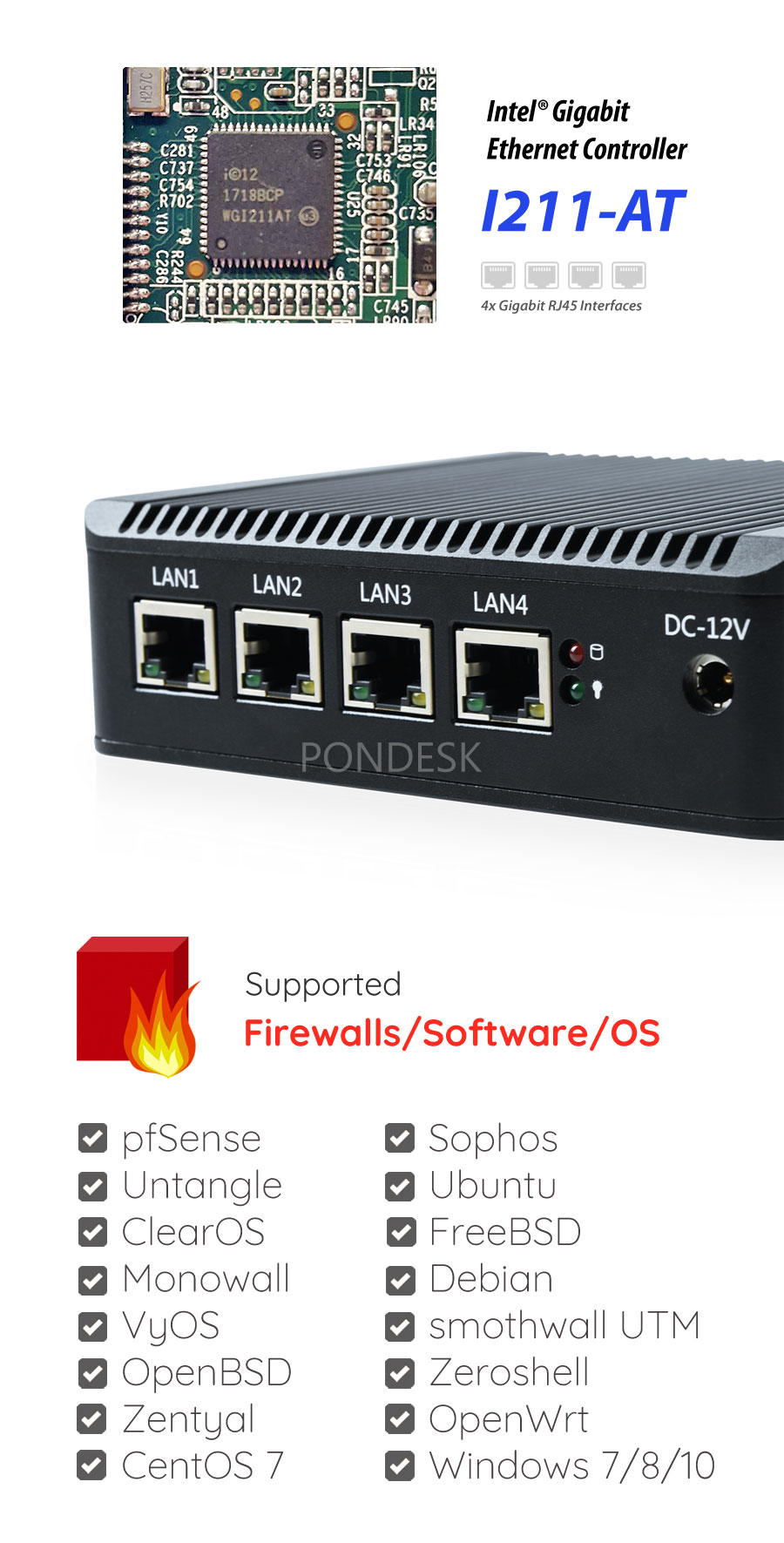
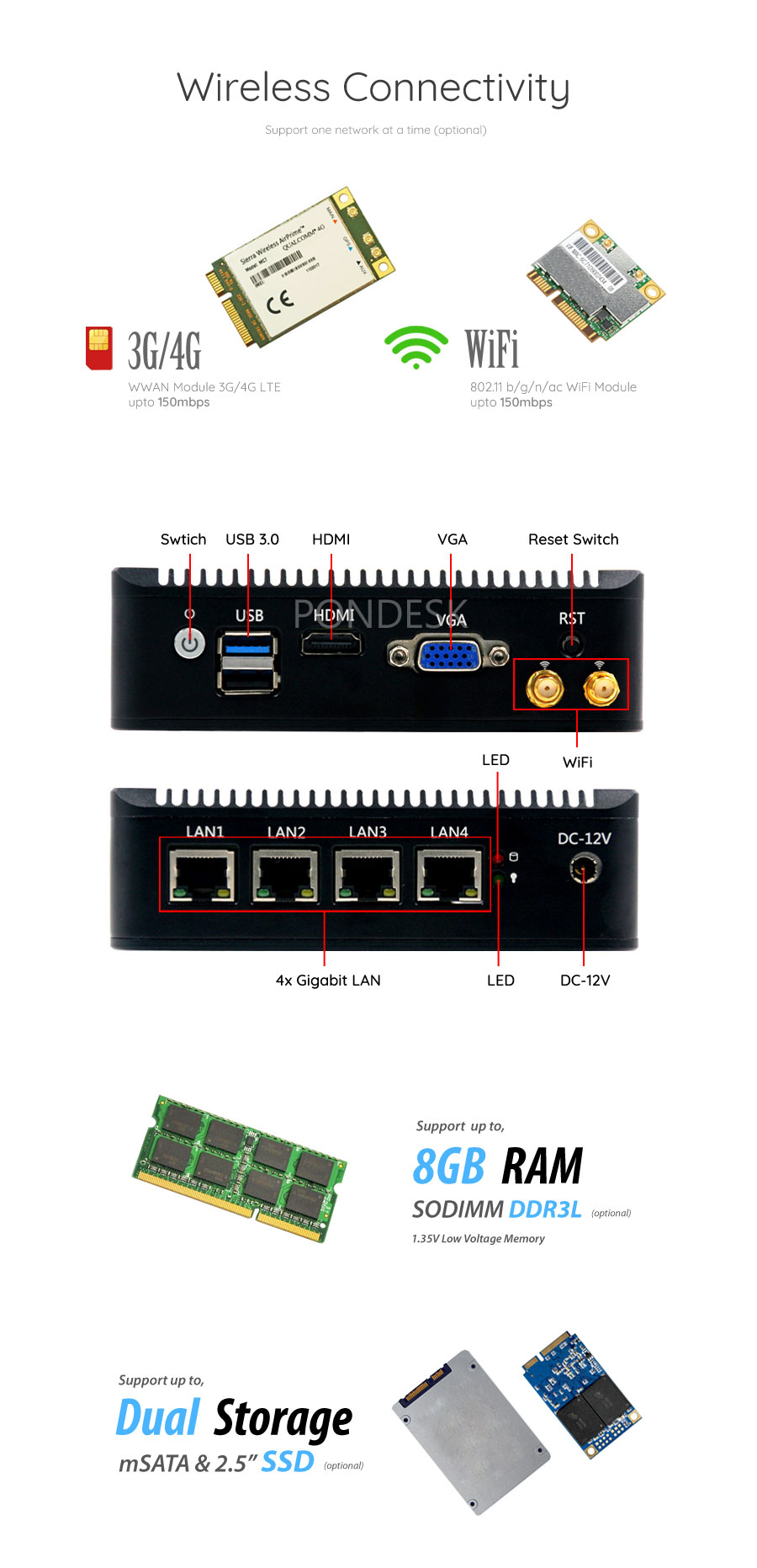
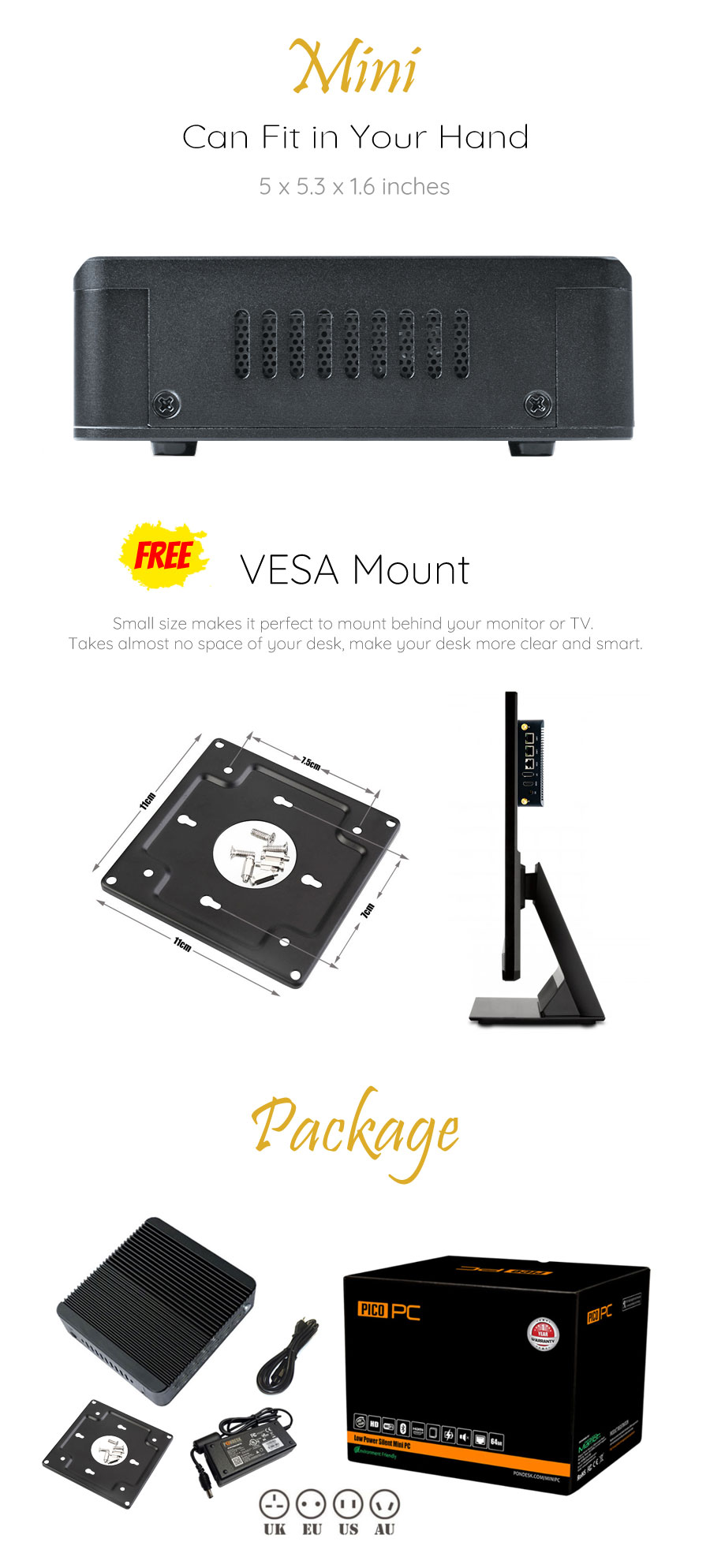

This section describes the real-world performance with respect to different firewalls; showing details below. This will outline the technical specification & configurations required by a firewall administrator to operate and troubleshoot the hardware/software properly.
|
pfSense
Hardware Performance |
||
|
Total Firewall Throughput |
Firewall Throughput |
1.75 Gbps |
|
IPS Throughput |
1.1 Gbps |
|
|
Number of Users |
400-800 |
|
|
Firewall Sessions |
Concurrent Sessions (TCP) |
400 K |
|
New Sessions/Second (TCP) |
36,000 |
|
|
IPSec VPN Peers |
600 |
|
|
IPSec VPN Tunnel Throughput |
IPSec VPN (TCP) AES-128
|
158 Mbps |
|
IPSec VPN (TCP) AES-256 |
140 Mbps |
|
|
IPSec VPN (UDP) AES-128
|
196 Mbps |
|
|
IPSec VPN (UDP) AES-256 |
145 Mbps |
|
|
OPEN VPN Throughput |
OPEN VPN (TCP) AES-256 Remote Access |
86 Mbps |
|
OPEN VPN (UDP) AES-256 Remote Access |
105 Mbps |
|
|
OPEN VPN (TCP) AES-256 end-to-end |
62 Mbps |
|
|
|
OPEN VPN (UDP) AES-256 end-to-end |
75 Mbps |
|
Bridge Mode Throughput |
L2 (TCP) |
958 Mbps |
|
L2 (UDP) |
961 Mbps |
|
|
NAT Mode Throughput |
L3 (TCP) |
952 Mbps |
|
L3 (UDP) |
955 Mbps |
|
|
Routed Mode Throughput |
L3 (TCP) |
958 Mbps |
|
L3 (UDP) |
957 Mbps |
|
|
OPNsense
Hardware Performance |
||
|
Total Firewall Throughput |
Firewall Throughput |
1.80 Gbps |
|
IPS Throughput |
600 Mbps |
|
|
Number of Users |
400-800 |
|
|
Firewall Sessions |
Concurrent Sessions (TCP) |
380 K |
|
New Sessions/Second (TCP) |
35,000 |
|
|
IPSec VPN Peers |
600 |
|
|
IPSec VPN Tunnel Throughput |
IPSec VPN (TCP) AES-128
|
150 Mbps |
|
IPSec VPN (TCP) AES-256 |
135 Mbps |
|
|
IPSec VPN (UDP) AES-128
|
200 Mbps |
|
|
IPSec VPN (UDP) AES-256 |
178 Mbps |
|
|
OPEN VPN Throughput |
OPEN VPN (TCP) AES-256 Remote Access |
95 Mbps |
|
OPEN VPN (UDP) AES-256 Remote Access |
120 Mbps |
|
|
OPEN VPN (TCP) AES-256 end-to-end |
72 Mbps |
|
|
|
OPEN VPN (UDP) AES-256 end-to-end |
76 Mbps |
|
Bridge Mode Throughput |
L2 (TCP) |
957 Mbps |
|
L2 (UDP) |
960 Mbps |
|
|
NAT Mode Throughput |
L3 (TCP) |
954 Mbps |
|
L3 (UDP) |
957 Mbps |
|
|
Routed Mode Throughput |
L3 (TCP) |
956 Mbps |
|
L3 (UDP) |
955 Mbps |
|
|
Untangle Hardware Performance |
||
|
Total
Firewall Throughput |
Firewall
Throughput |
1.76 Gbps |
|
IPS
Throughput |
850 Mbps |
|
|
Number of
Users |
400-800 |
|
|
Firewall
Sessions |
Concurrent
Sessions (TCP) |
130 K |
|
New
Sessions/Second (TCP) |
25,000 |
|
|
IPSec VPN
Peers |
600 |
|
|
IPSec VPN
Tunnel Throughput |
IPSec VPN
(TCP) AES-128 |
190 Mbps |
|
IPSec VPN
(TCP) AES-256 |
170 Mbps |
|
|
IPSec VPN
(UDP) AES-128 |
235 Mbps |
|
|
IPSec VPN
(UDP) AES-256 |
200 Mbps |
|
|
OPEN VPN
Throughput |
OPEN VPN
(TCP) AES-256 Remote Access |
115 Mbps |
|
OPEN VPN
(UDP) AES-256 Remote Access |
140 Mbps |
|
|
OPEN VPN (TCP) AES-256 end-to-end |
75 Mbps |
|
|
OPEN VPN (UDP) AES-256 end-to-end |
92 Mbps |
|
|
Bridge Mode
Throughput |
L2 (TCP) |
954 Mbps |
|
L2 (UDP) |
960 Mbps |
|
|
NAT Mode
Throughput |
L3 (TCP) |
952 Mbps |
|
L3 (UDP) |
954 Mbps |
|
|
Routed Mode
Throughput |
L3 (TCP) |
950 Mbps |
|
L3 (UDP) |
951 Mbps |
|
|
Sophos Hardware Performance |
||
|
Total
Firewall Throughput |
Firewall
Throughput |
1.70 Gbps |
|
IPS
Throughput |
650 Mbps |
|
|
Number of
Users |
400-800 |
|
|
Firewall
Sessions |
Concurrent
Sessions (TCP) |
320 K |
|
New
Sessions/Second (TCP) |
30,000 |
|
|
IPSec VPN
Peers |
600 |
|
|
IPSec VPN
Tunnel Throughput |
IPSec VPN
(TCP) AES-128 |
120 Mbps |
|
IPSec VPN
(TCP) AES-256 |
100 Mbps |
|
|
IPSec VPN
(UDP) AES-128 |
210 Mbps |
|
|
IPSec VPN
(UDP) AES-256 |
95 Mbps |
|
|
OPEN VPN
Throughput |
OPEN VPN
(TCP) AES-256 Remote Access |
125 Mbps |
|
OPEN VPN
(UDP) AES-256 Remote Access |
80 Mbps |
|
|
OPEN VPN (TCP) AES-256 end-to-end |
56 Mbps |
|
|
OPEN VPN (UDP) AES-256 end-to-end |
40 Mbps |
|
|
Bridge Mode
Throughput |
L2 (TCP) |
950 Mbps |
|
L2 (UDP) |
955 Mbps |
|
|
NAT Mode
Throughput |
L3 (TCP) |
950 Mbps |
|
L3 (UDP) |
953 Mbps |
|
|
Routed Mode
Throughput |
L3 (TCP) |
951 Mbps |
|
L3 (UDP) |
954 Mbps |
|
|
Kerio Control Hardware Performance |
||
|
Total
Firewall Throughput |
Firewall
Throughput |
1.60 Gbps |
|
IPS
Throughput |
700 Mbps |
|
|
Number of
Users |
400-800 |
|
|
Firewall
Sessions |
Concurrent
Sessions (TCP) |
100 K |
|
New
Sessions/Second (TCP) |
16,000 |
|
|
IPSec VPN
Peers |
600 |
|
|
IPSec VPN
Tunnel Throughput |
IPSec VPN
(TCP) AES-128 |
85 Mbps |
|
IPSec VPN
(TCP) AES-256 |
70 Mbps |
|
|
IPSec VPN
(UDP) AES-128 |
200 Mbps |
|
|
IPSec VPN
(UDP) AES-256 |
180 Mbps |
|
|
IPSec VPN
Server Throughput |
IPSec VPN
(TCP) AES-128 Remote Access |
90 Mbps |
|
IPSec VPN
(UDP) AES-128 Remote Access |
92 Mbps |
|
|
IPSec
VPN (TCP) AES-128 end-to-end |
50 Mbps |
|
|
IPSec
VPN (UDP) AES-128 end-to-end |
60 Mbps |
|
|
KERIO VPN
Throughput |
Kerio VPN
(TCP) AES-256 Remote Access |
150 Mbps |
|
Kerio VPN
(UDP) AES-256 Remote Access |
180 Mbps |
|
|
Kerio
VPN (TCP) AES-256 end-to-end |
72 Mbps |
|
|
Kerio
VPN (UDP) AES-256 end-to-end |
85 Mbps |
|
|
VLAN Mode
Throughput |
L3 (TCP) |
954 Mbps |
|
L3 (UDP) |
956 Mbps |
|
|
NAT Mode
Throughput |
L3 (TCP) |
952 Mbps |
|
L3 (UDP) |
955 Mbps |
|
|
Routed Mode
Throughput |
L3 (TCP) |
950 Mbps |
|
L3 (UDP) |
955 Mbps |
|
|
Endian Hardware Performance |
||
|
Total
Firewall Throughput |
Firewall
Throughput |
1.80 Gbps |
|
IPS
Throughput |
640 Mbps |
|
|
Number of
Users |
400-800 |
|
|
Firewall
Sessions |
Concurrent
Sessions (TCP) |
260 K |
|
New
Sessions/Second (TCP) |
20,000 |
|
|
IPSec VPN
Peers |
600 |
|
|
IPSec VPN
Tunnel Throughput |
IPSec VPN
(TCP) AES-128 |
132 Mbps |
|
IPSec VPN
(TCP) AES-256 |
127 Mbps |
|
|
IPSec VPN
(UDP) AES-128 |
200 Mbps |
|
|
IPSec VPN
(UDP) AES-256 |
186 Mbps |
|
|
OPEN VPN
Throughput |
OPEN VPN
(TCP) AES-256 Remote Access |
135 Mbps |
|
OPEN VPN
(UDP) AES-256 Remote Access |
150 Mbps |
|
|
OPEN VPN (TCP) AES-256 end-to-end |
90 Mbps |
|
|
OPEN VPN (UDP) AES-256 end-to-end |
115 Mbps |
|
|
Bridge Mode
Throughput |
L2 (TCP) |
956 Mbps |
|
L2 (UDP) |
962 Mbps |
|
|
NAT Mode
Throughput |
L3 (TCP) |
950 Mbps |
|
L3 (UDP) |
957 Mbps |
|
|
Routed Mode
Throughput |
L3 (TCP) |
955 Mbps |
|
L3 (UDP) |
954 Mbps |
|